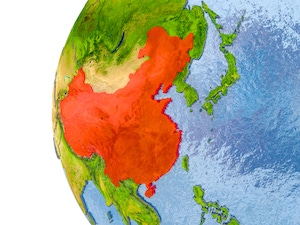Gentle reminder from Xi Jinping that China is a communist country
The president of China is pushing to embed the Communist Party deeper into the world’s second-largest economy. Off the record, some foreign businesses express concern that the party is creeping into their operations.
January 8, 2018

 Those in the United States who believe that Red China might be turning a lighter shade of pink as the country moves toward capitalism may want to rethink that idea. It seems that President Xi Jinping is cracking down on membership in the Communist Party, and that means encroaching on foreign workplaces.
Those in the United States who believe that Red China might be turning a lighter shade of pink as the country moves toward capitalism may want to rethink that idea. It seems that President Xi Jinping is cracking down on membership in the Communist Party, and that means encroaching on foreign workplaces.
Lest employees of foreign companies get too cozy with their employer’s capitalist way of life, Xi is “pushing to embed the Communist Party deeper into the world’s second-largest economy,” reported a Wall Street Journal article late last year. “Under Mr. Xi, the party has pushed to exert greater state control over the economy and rein in some market-oriented experiments of recent years. Chinese regulators recently proposed that the state take 1% stakes in major Chinese internet companies.”
This more assertive stance has some companies wondering just how much the party will encroach on workers’ time, as they are encouraged to participate in party functions during working hours. The WSJ article said that “foreign companies haven’t publicly criticized China over the initiative. Several Western executives said in interviews that open dissent would be corporate suicide in a critical market.”
While China denies that the party is interfering with workers or company business, acting only as a “positive force” to “advise company managers on government policies, help businesses cultivate talent and resolve friction with workers,” companies aren’t buying it. “We’re concerned that the party is pushing the envelope and creeping into the company,” one company manager told the WSJ.
Any good business person who has ever dealt with foreign countries could have seen the handwriting on the wall 20 years ago. Did anyone really believe that China was allowing U.S. corporations to set up shop in China to provide Chinese consumers with more U.S. manufactured goods and technology? In The Art of War, Sun Tzu writes, “The greatest victory is that which requires no battle.”
Invite your challenger into your house, have him sit down and eat a meal with you. Encourage him to bring his technology assets, build a company, hire and train the people in the technology that is desired, and then do not allow him to take his assets with him when he sees that what you are after is the knowledge of how to become like he is. “The supreme art of war is to subdue the enemy without fighting.”
The government is also “tightening capital controls in China; growing regulatory scrutiny of acquisitions of U.S. technology firms sent the total value of Chinese acquisitions in the sector plummeting 87% last year,” said a Jan. 5 WSJ article.
For more than a decade, Harry Moser has warned U.S. manufacturers that going to China with intellectual property, creating huge manufacturing operations with high-tech machinery and teaching them how it’s done is a dangerous path. Loss of intellectual property and patent theft has been just the tip of the iceberg. Nothing leaves China—not machinery, know-how or IP. If the Communist Party becomes too heavy-handed with employees and begins to impinge on workplace operations, that will just be one more price to pay for blithely entering that seemingly welcoming environment. Moser’s Reshoring Initiative has had an impact on U.S. manufacturing, giving companies pause when they consider taking more work offshore to China, even causing some to reconsider a move there. But more needs to be done.
A recent statement by Scott Paul, President of the Alliance for American Manufacturing, noted that while the AAM is “pleased to see good manufacturing job growth in December to close out 2017 . . . the key question is how to keep factory job momentum in 2018. It starts with the administration acting decisively on long-deferred promises to crack down on unfairly traded imports from China and other countries, and continues with a much-needed boost in infrastructure spending.”
China’s recent crackdown on Communist Party membership along with greater oversight of foreign companies just might provide added incentive for companies to refrain from being fooled into thinking that China is just another capitalist society. While China may have seen the light in some respects, that light is still red.
About the Author(s)
You May Also Like




